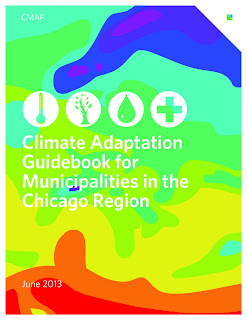The guidebook serves as a toolkit of sorts to help planners, administrators, and others formulate comprehensive plans and responses to current and future effects resulting from a changing climate. The guidebook addresses a number of water related issues and vulnerabilities, including flood protection and mitigation, meeting drinking water needs, and more.
About Newsroom
Recent News
- Sea Grant Chats: Looking back on our AIS legacy as we move forward
- National Sea Grant welcomes 2026 Knauss Marine Policy Fellowship finalists
- IISG’s new year starts with a new research and reporting coordinator
- Ripple Effects curriculum engages students on the spread of aquatic invasive species
- Coastal communities can tap into IISG resources as they manage beach sand and structures
IISG Instagram
Some partnerships just make sense. Happy Valentine’s Day from IISG! 💕

This February marks a major milestone: 30 years of aquatic invasive species outreach by our team! To celebrate, IISG Director, Stuart Carlton, and Strategic Communication Coordinator, Renie Miles, sat down for a Sea Grant Chat with two key figures in IISG’s AIS history: Pat Charlebois, our assistant director and program leader, who spent over two decades leading our prevention efforts, and Katie O’Reilly, who took over that role in 2022. We discussed the evolution of the invasive species issue in the Great Lakes, the shift toward understanding human behavior, and the creative strategies that make this team so effective.
Dive into the full interview at the link in bio.

Introducing the Lake Michigan Explorer!
Start exploring the varied factors that impact the Great Lakes with our Explorer Series. This searchable database of external resources can help you find hands-on activities that spark curiosity and inspire action.
✨ What’s inside?
Lesson plans, fact sheets, and reading materials
Engaging videos and visualizations
Easy-to-use filters by grade level, topic, and time.
Perfect for classrooms and informal learning, this resource empowers students to become stewards of the Great Lakes.
🔗 in bio for more.

Announcing a Lake Superior immersion for educators! Formal and nonformal 5-12th-grade educators from throughout the Great Lakes states are invited to apply for an exciting opportunity to spend a week aboard a U.S. Environmental Protection Agency research vessel alongside scientists and to bring Great Lakes science back to their classrooms. The program, organized by the Center for Great Lakes Literacy, is July 7-13, 2026, on Lake Superior.
🔗 Apply today at the link in bio.
📅 Application Deadline: February 28, 2026
This program is made possible by Illinois-Indiana Sea Grant and CGLL with funding and support from EPA, NOAA, and the Great Lakes Restoration Initiative.


